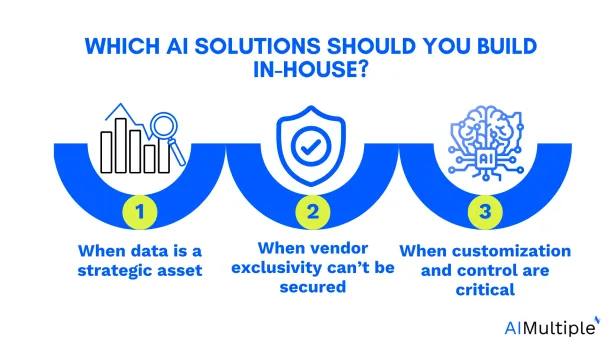Although off-the-shelf AI tools support many enterprise needs, they often fall short in high-impact, data-specific use cases. Businesses operating in complex or niche environments often find that generic AI solutions can’t effectively accommodate their unique workflows or leverage proprietary data.
Explore when custom AI is necessary, its development paths, and how to evaluate and select the right partners. Whether you’re looking to optimize operations, build a competitive advantage, or overcome gaps in existing software, custom AI may be the answer.
Custom AI, ready-to-use or hybrid solutions?
| Type | Customer profile | Benefits |
|---|---|---|
| Custom AI | Businesses needing high control, unique use case coverage, and own custom development. | Maximum customization, superior accuracy, aligned with internal data, brand, and process. |
| Ready-to-Use/Off-the-Shelf AI | Small teams, startups, or companies needing quick solutions for customer inquiries or support. | Started quickly, low technical barrier, great for fast feedback, test, or chat deployment. |
| Hybrid AI | Mid-sized businesses wanting fast launch with some custom control over AI tools or agents. | Save time with partial build, flexible integration, scalable with evolving business needs. |
Custom AI
Custom AI development is the process of designing and building an AI system tailored specifically to a business’s needs, goals, and data. Unlike ready-to-use or off-the-shelf solutions, which can be generic and intended to serve a broad market, custom AI is tailored to meet a single organization’s specific requirements, performance expectations, and unique use case needs.
This type of development often involves creating or fine-tuning AI models, agents, or AI character-based features that closely align with company workflows, whether for automating customer inquiries, processing research questions, or analyzing complex datasets.
Businesses can utilize an AI studio or a dedicated development team to create these systems from scratch, providing full control over training methods, outputs, and integration with existing platforms, such as websites or CRM systems.
For example, a restaurant chain that embraces local dining customs might develop a custom AI that teaches or promotes regional etiquette, thereby enhancing customer engagement and satisfaction. Or a company could create an AI agent that learns from internal feedback to improve service delivery or sales outreach.
While custom AI requires more time, resources, and often higher upfront investment, the benefits include:
- Superior accuracy and efficiency in solving domain-specific problems.
- A solution that evolves with your team, business, and customer feedback.
- Flexibility to train, test, and improve the AI continuously based on real-time feedback and proprietary data.
Ultimately, custom AI development is ideal for companies seeking to save time in the long run by deploying a scalable solution that aligns with their unique processes, audience, and strategic goals.
Ready-to-use or off-the-shelf AI
These are pre-built AI systems or tools designed for immediate deployment, often requiring minimal setup and configuration. Examples include chatbots, AI characters, or customer service solutions that can respond to users or customers without extensive development.
Ideal for those who want to get started quickly, these solutions help test ideas, discover AIs, and learn how AI might fit into their business. While they lack full customization, they’re perfect for small teams or businesses looking to improve efficiency, manage customer inquiries, or enhance their Instagram audience engagement without the need to build from scratch.
Hybrid AI solutions
Hybrid AI blends the flexibility of custom AI with the speed of ready-to-use AI. Companies can utilize pre-built models or AI tools and enhance them with their own custom logic or prompt templates, thereby tailoring specific parts of the solution to fit their unique processes.
For example, a studio might integrate AI to handle feedback on local dining customs or courses on embracing local dining customs, while retaining the ability to train or adjust it using internal data or user feedback. Hybrid AI is ideal for businesses that aim to save time while still requiring moderate custom features and informed decision-making support.
Types of custom AI: Configure existing tools or build from scratch
Just like custom software, custom AI comes in two main forms—each suited to different business needs, levels of control, and available resources.
1. Configuring existing AI tools
This approach involves using an existing AI system—whether open-source, proprietary, or vendor-provided—and adapting it to meet the specific needs of a company. The foundation is already in place, but it needs to be refined through configuration, additional training, or integration.
For example, a company might utilize a general-purpose AI chatbot framework and tailor it to address its unique customer inquiries, leveraging its internal data, prompt templates, and feedback. This setup may involve integrating the AI into a website, linking it with internal systems such as CRMs or help desks, or aligning its responses with the brand’s voice, such as responding in the tone of an AI character representing the company on its Instagram profile.
Just like how ERP systems require extensive configuration to match a company’s processes, configuring existing AI tools can take weeks or even months. However, this approach can save time compared to full development, especially when the company has a clear use case, access to relevant data, and support.
2. Building AI from scratch
In cases where no existing solution meets their needs, companies may opt to develop their own AI solution from scratch. This method is often used by businesses with unique operational needs, highly specialized domains, or large-scale requirements that off-the-shelf tools can’t handle.
Building from scratch involves selecting or building models, writing original code, and often using AI studio environments or software libraries for development. For example, a company might develop an AI agent trained on proprietary research questions, internal reports, or customer feedback, designed specifically to answer, respond to, or generate content in a way that no public tool can.
This approach offers full control over everything—from how the AI is trained to how it performs in specific industry scenarios. While it requires more development effort, it enables companies to create deeply embedded solutions that align with their team’s operations, customer service needs, or even localized applications, such as honoring local dining customs through conversational AI.
In both approaches, the goal is to build something that fits, rather than forcing a generic system into a role it wasn’t designed for. Whether a company configures existing AI tools or creates its own, the result is a solution designed to meet real demands, support existing systems, and serve the right audience.
When does a business need a custom AI solution?
Although businesses primarily achieve their AI transformation through off-the-shelf solutions, the AI market may not offer a specific solution to address their unique problems. Businesses can benefit from a custom AI/ML development when:
Off-the-shelf solutions have limited performance
Different applications have a drastically different impact on financial performance. When an application’s financial impact is significant, it may be worthwhile to build a custom solution to achieve higher performance compared to an off-the-shelf solution.
Here is an example:
A B2B enterprise sales team wants to optimize account prioritization using AI. An off-the-shelf lead scoring solution may be trained on generic datasets from unrelated industries (e.g., B2C eCommerce). This might result in low accuracy when ranking B2B accounts by potential value or likelihood to convert.
In contrast, building a custom AI model trained on internal CRM data, deal histories, and firmographic features might significantly outperform the off-the-shelf option. The resulting 10% boost in sales effectiveness could translate into millions in additional revenue.
Compare this with a robotic process automation (RPA) tool that automates a monthly manual report, saving just a few hours per month. Even if the RPA tool is perfectly optimized, its financial impact would be minimal in comparison.
Off-the-shelf solutions need significant configuration
This could be due to a lack of integrations or due to the low initial performance of the off-the-shelf solution. Machine learning relies on data, and if the company’s data is not similar to the training data of the model, the model’s performance may be low.
For example:
A retail chain adopts an off-the-shelf computer vision solution for detecting empty shelves in real time. However, the model was trained on US-based grocery store layouts and lighting, while this retailer operates in Southeast Asia with different shelving configurations and lighting conditions.
To improve the solution’s accuracy, the retailer must:
- Capture thousands of local in-store images,
- Hire a data annotation service to label them,
- Retrain the model in collaboration with the vendor or a consultant.
This adds cost, delays deployment, and requires internal expertise, reducing the perceived “plug-and-play” benefit of the off-the-shelf tool.
Off-the-shelf solutions do not exist
AI is an emerging field, and mature solutions do not exist in every business function or industry. For example:
A marine logistics company wants to use AI to optimize ship fuel usage based on weather, route, cargo weight, and engine type. This problem is highly specialized, and no off-the-shelf AI tool exists that incorporates all these unique variables.
As a result, the company would need to:
- Collaborate with a maritime AI consultancy,
- Build a custom solution leveraging historical voyage data and weather APIs,
- Continuously test and refine the model for each vessel type.
This type of innovation is common in emerging fields or niche industries where commercial demand hasn’t yet reached scale to justify a productized solution.
Which AI solutions should you build in-house?

Not every AI solution needs to be built internally, but in some cases, developing your own custom AI makes practical and strategic sense, especially when data and control are key priorities:
When your data is a strategic asset
AI systems improve with access to high-quality, relevant data. Companies operating at a larger scale often have access to proprietary datasets from their own processes, customer interactions, or internal research. This type of data can power more capable and relevant AI agents—whether it’s a model that can respond accurately to niche customer inquiries, generate product-specific images, or handle complex research questions unique to your domain.
Building in-house ensures that these AI tools are trained using your own custom data, tailored to your audience, and designed around your workflows.
When vendor exclusivity can’t be secured
If a third-party AI vendor can’t offer exclusive access or protection around a solution trained on your data, then in-house development is often the safer choice. This is especially true when the solution could provide a competitive advantage. You wouldn’t want a vendor to use the same models trained on your insights to assist your competitors.
When customization and control are critical
Companies may also build in-house when off-the-shelf solutions can’t be customized enough. This could include AI that powers chat, internal agent workflows, or tailored tools that learn from specific customer behaviors.
What are the most common areas for custom AI development?
Computer vision solutions
Computer vision involves training AI to interpret and understand images or video content. Companies develop custom solutions in this space when they need systems that can respond to visual cues specific to their operations. Since visual inspection or classification processes often vary from one organization to another, off-the-shelf models may not perform well without deep customization.
Custom-built solutions allow teams to train systems using internal data, ensuring the AI can answer the right questions and spot the correct patterns. This enables the creation of highly specialized tools that support quality checks, internal safety requirements, or any visual task tied to company-specific standards.
Conversational AI platforms
Conversational AI includes chatbots, AI agents, and virtual assistants that use natural language processing (NLP), natural language understanding (NLU), and natural language generation (NLG) technologies. Businesses often develop their own platforms to better handle customer inquiries, chat, and internal support tasks. A custom AI approach lets them embed specific workflows, branded responses, and prompt templates that reflect the company’s tone and audience needs.
By using their own custom datasets and training routines, companies improve efficiency and accuracy across customer-facing or internal communication systems. Whether deployed on a website, used for internal courses, or integrated with customer service channels, these platforms are tailored to respond precisely and consistently.
Other machine learning solutions
Beyond vision and language, many companies build custom AI systems in broader machine learning domains. These include predictive analytics, anomaly detection, and fraud prevention—areas where the problem definitions and data characteristics differ significantly between organizations.
While off-the-shelf solutions exist in these categories, businesses often find that performance drops when the AI is applied to their own industry, process, or team workflows. Custom development lets them test, improve, and integrate models that truly align with their operations and evolving use cases.
Custom AI development: Partner options & considerations
AI consulting services
AI consulting services enable companies to leverage AI technologies and enhance their business operations. With their experience in numerous client projects, these companies can develop and productize custom AI solutions for their clients. They can also help clients formulate an AI strategy, identify AI use cases, implement AI/ML solutions, and provide training to clients’ employees.
Digital transformation consulting services
Digital transformation consultants assist companies in implementing digital transformation strategies to enhance their performance through the effective use of digital technologies. These consultants can provide custom AI/ML solutions according to business needs.
Starting a data science competition
Businesses can launch competitions to address their challenges by utilizing a crowdsourced AI workforce. Businesses define the problem, present data that the crowd will use, and offer a prize for the winner by using competition platforms. Data scientists develop customized AI/ML algorithms and solutions that can help tackle the specific challenges for businesses.
Launching AI competitions is challenging since it requires expertise in data encryption and access to external data science talent. Therefore, companies can get support from vendors that provide AI consulting and data science competition services to businesses for their custom AI needs. They identify AI applications, use the crowd to build high-performing solutions, and also help companies build in-house AI/ML teams.
ML development companies
There are software development firms that focus on AI and ML solutions. They combine data science expertise with practical domain knowledge to deliver integrated custom solutions to address real business challenges.
These companies focus on specific areas, such as machine vision or conversational AI, since the machine learning approaches that solve these problems are somewhat distinct. For instance, Master of Code focuses on building conversational AI solutions for their clients.
Freelancers
As with any software development, companies can work with freelancers to build machine learning solutions. This approach is more difficult to manage than working with a separate company. However, it could result in savings.
What type of custom AI development would be suitable for your project?
| Approach | Situation | Details | Considerations |
|---|---|---|---|
| AI Consulting Companies | Needs help defining AI use case | Offers strategy + implementation support | Higher cost, good for early-stage planning |
| Data Science Competitions | Has data encryption & clear use case | Build solutions affordably, boost recruiting appeal | Needs proper encryption, less control |
| ML Dev Companies / Freelancers | Clear goal but can't encrypt sensitive data | Direct build with experienced devs or freelancers | Needs hands-on support, freelancers are budget-friendly |
There are various ways to handle outsourcing custom AI development tasks, yet, you need to assess which approach suits your business needs the most. This will depend on the data to be used, management attention, your company’s ability to provide the project, and your company’s budget.
When the company:
- Needs support in identifying the business aspects of their AI application, AI consulting companies can be good to work with. However, getting both strategy and implementation support will definitely increase the project’s budget.
- Can find ways to encrypt its data with outside support and has already identified AI use cases, data science competitions can help build effective solutions economically while also improving the company’s brand as a recruiter. Data science competition organizers can also help companies identify ways to encrypt their data which will still allow data scientists to work on it.
- Is clear on how the AI model will support their business and can not encrypt their data in a way that supports model development, it needs to work with ML development companies or freelancers. If the company has experience working with freelancers and can afford the management attention to support them, freelancers could be a budget-friendly alternative to ML development companies
How to assess custom AI development partners?
Following outsourcing procurement best practices helps in choosing an AI development partner, too:
- References in the specific area: A computer vision company shouldn’t build your conversational AI solution. You should ask for example case studies in the specific location from outsourcing partners. This way, you can better assess partners’ capability to solve your problem.
- Geographic coverage: Building a conversational AI solution in Chinese may not be easy for a conversational AI company that has never worked with the language. This needs to be taken into account, especially in choosing conversational AI partners
- Other outsourcing procurement best practice,s which include evaluating companies based on Total Cost of Ownership, ensuring support and compliance with your company’s information security guidelines, etc,. are also important



Comments
Your email address will not be published. All fields are required.